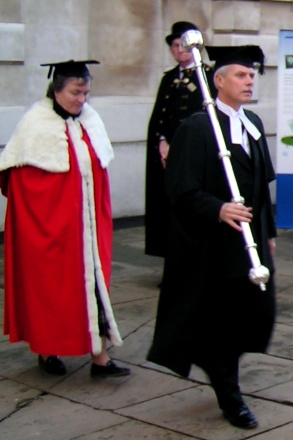Beadle
George Wells Beadle (October 22, 1903 – June 9, 1989) was an American geneticist who won the Nobel Prize in Physiology or Medicine in 1958, sharing it with Edward Tatum for their discovery that genes act by regulating definite chemical events. Beadle and Tatum's work laid the foundations for the field of molecular biology. Their experiments with the bread mold Neurospora crassa demonstrated that mutations in genes could produce specific defects in metabolic pathways. This work was seminal in demonstrating the one gene-one enzyme hypothesis.
Early Life and Education[edit | edit source]
George Beadle was born in Wahoo, Nebraska, and grew up on a farm. He developed an interest in science early in life, particularly in genetics, after reading the works of Gregor Mendel. He attended the University of Nebraska, where he received his B.S. in agriculture in 1926 and his M.S. in genetics in 1927. Beadle then went on to earn his Ph.D. from Cornell University in 1931, where he studied under Rollins Adams Emerson and became interested in the genetics of maize.
Career and Research[edit | edit source]
After completing his Ph.D., Beadle took a position at the California Institute of Technology (Caltech), where he began his collaboration with Edward Tatum. Their groundbreaking experiments involved exposing the bread mold Neurospora crassa to X-rays, causing mutations. They then observed the metabolic effects of these mutations, which led to the formulation of the one gene-one enzyme hypothesis. This hypothesis proposed that each gene in an organism is responsible for the production of a single enzyme that in turn affects a single step in a metabolic pathway.
Beadle's research shifted the focus of genetics from the study of whole organisms and their traits to the chemical reactions that underlie hereditary differences. This shift had a profound impact on the development of molecular biology as a field.
In 1946, Beadle became the Chairman of the Division of Biology at Caltech, where he continued his research. He later served as the President of the University of Chicago from 1961 to 1968, where he was instrumental in establishing the Committee on Genetics and promoting interdisciplinary research.
Nobel Prize[edit | edit source]
In 1958, George Beadle and Edward Tatum were awarded the Nobel Prize in Physiology or Medicine "for their discovery that genes act by regulating definite chemical events." This award recognized their contributions to the understanding of the genetic control of biochemical reactions.
Legacy[edit | edit source]
George Beadle's work has had a lasting impact on the fields of genetics and molecular biology. He is remembered not only for his scientific achievements but also for his role as an educator and administrator. Beadle's research demonstrated the power of using model organisms in genetic studies, a practice that remains a cornerstone of genetic and molecular biological research today.
Personal Life[edit | edit source]
Beadle was married to Muriel McClure in 1936, with whom he had one son. He was known for his simplicity, often biking to work and preferring a modest lifestyle despite his significant scientific achievements.
Death[edit | edit source]
George Beadle passed away on June 9, 1989, in Pomona, California. His contributions to science have left an indelible mark on the field of genetics and have paved the way for future generations of scientists.
Search WikiMD
Ad.Tired of being Overweight? Try W8MD's physician weight loss program.
Semaglutide (Ozempic / Wegovy and Tirzepatide (Mounjaro / Zepbound) available.
Advertise on WikiMD
|
WikiMD's Wellness Encyclopedia |
| Let Food Be Thy Medicine Medicine Thy Food - Hippocrates |
Translate this page: - East Asian
中文,
日本,
한국어,
South Asian
हिन्दी,
தமிழ்,
తెలుగు,
Urdu,
ಕನ್ನಡ,
Southeast Asian
Indonesian,
Vietnamese,
Thai,
မြန်မာဘာသာ,
বাংলা
European
español,
Deutsch,
français,
Greek,
português do Brasil,
polski,
română,
русский,
Nederlands,
norsk,
svenska,
suomi,
Italian
Middle Eastern & African
عربى,
Turkish,
Persian,
Hebrew,
Afrikaans,
isiZulu,
Kiswahili,
Other
Bulgarian,
Hungarian,
Czech,
Swedish,
മലയാളം,
मराठी,
ਪੰਜਾਬੀ,
ગુજરાતી,
Portuguese,
Ukrainian
Medical Disclaimer: WikiMD is not a substitute for professional medical advice. The information on WikiMD is provided as an information resource only, may be incorrect, outdated or misleading, and is not to be used or relied on for any diagnostic or treatment purposes. Please consult your health care provider before making any healthcare decisions or for guidance about a specific medical condition. WikiMD expressly disclaims responsibility, and shall have no liability, for any damages, loss, injury, or liability whatsoever suffered as a result of your reliance on the information contained in this site. By visiting this site you agree to the foregoing terms and conditions, which may from time to time be changed or supplemented by WikiMD. If you do not agree to the foregoing terms and conditions, you should not enter or use this site. See full disclaimer.
Credits:Most images are courtesy of Wikimedia commons, and templates, categories Wikipedia, licensed under CC BY SA or similar.
Contributors: Prab R. Tumpati, MD





